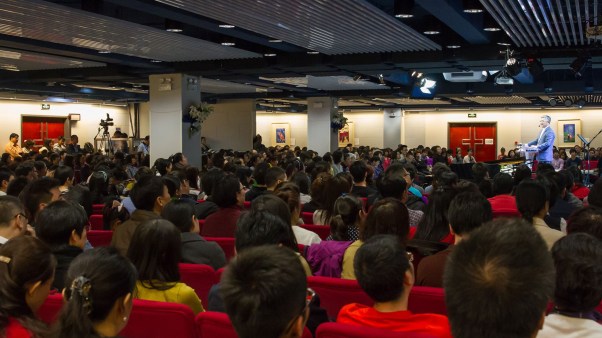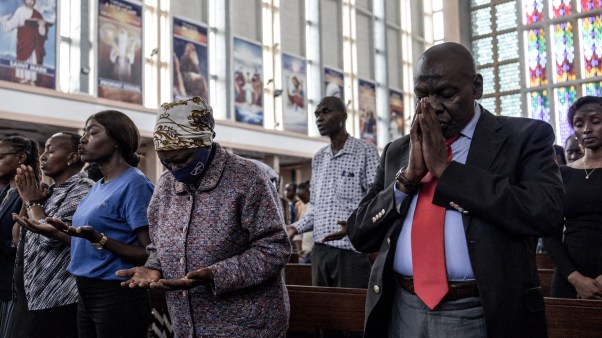Once, a man decided to attend religious services while visiting a new town. He went to the meeting location and made a bunch of new friends, just like that.
The man in question was the apostle Paul, and we learn this story of his visit to Philippi, including that friendly Sabbath, from Acts 16. Unfortunately, most of us aren’t like Paul in multiple key respects, so perhaps the story should be accompanied by a warning: results not typical. For most of us, making friends in a new church is hard.
I’ve been thinking about this a lot over the past year because, last July, my family moved from Georgia to Ohio for my husband’s job. It was a difficult move; we have way too many books, it turns out, and they’re heavy. But far worse than shifting the books was leaving behind so many people we’ve known and loved for years—friends at church chief among them.
Leaving is only part of the trouble, however, and finding a new church isn’t the end of it either. Once you’ve settled on a local congregation, just how do you make friends?
It’s important to mention at this point that my husband and I, both socially awkward academics, are not as bold as Paul and have zero skill in small talk. I’m plenty familiar with the lives and writings of people who’ve been dead for two millennia or longer but often find living people rather harder to understand. And yet, being in community with them is a requirement of our faith (Heb. 10:25). God created us for community with himself and other believers, and church community is both a scene and source of spiritual growth. It’s also—eventually—lots of fun, even for the awkward like us.
The question, then, is how you get past that “eventually.” It isn’t easy. If you haven’t been that new person in a while, I want to remind you that it can be scary and uncomfortable. Feeling like the outsider was hard in kindergarten and third grade. It’s still hard, it turns out, when you’re a full-fledged grownup. And hard as it is for a family like mine to get settled in a new community, sitting in church alone, as theologian Dani Treweek eloquently reminds us, adds yet another layer of discomfort.
But this isn’t just a matter of hurt feelings. Not making friends at church can easily become a spiritual problem. I’ve encountered too many stories of people leaving churches (or quitting church altogether) because they struggled to make friends—because after weeks or even months of attendance, no one tried to get to know them or invited them for a meal.
In one case, a family attended a large church for about a year. They never formally joined, but they were there most Sundays. Then the dad got very sick. They missed church for a month and a half, but no one ever checked in. It seemed, they thought, as if no one even noticed they were gone.
It would be easy to blame congregations in stories like these for being too cliquish—or perhaps not attentive enough to people’s needs or insufficiently welcoming to newcomers. Sometimes the villain in these stories really is a communal callousness or lack of pastoral care.
Often, though, I think the situation is far more innocent. My example above involves a large church with multiple services. It’s easy for people to get lost in the crowd. Maybe someone noticed this family wasn’t there for a few weeks and simply assumed they had switched to another service. But also, remember that the family never became members, even after attending for a year. It’d be reasonable to think they’d just decided to go elsewhere, especially if they weren’t involved in church activities outside of Sunday mornings.
I tell this story as I turn to talking solutions because it points us to the most important thing to remember when you’re trying to make friends at church: In almost every case, everyone wants to make this happen—it’s just that it takes effort and commitment on all sides. Just as the old guard must remember how difficult it is to come into a new community, so newcomers must remember that initiation is their responsibility too. As we so easily tell children, be the friend that you want someone else to be to you.
And that’s really the only solution I have to offer, because it’s the only solution there is: You make friends at church by being a friend at church.
It’s what my husband, Dan, and I have tried to do here in Ohio, however imperfectly. We started getting to know others in the congregation not only on Sundays but outside church walls. We invited people over for meals at our house and to join us at activities like local concerts. We invited ourselves over to visit friends who were housebound for a time (e.g., while recovering from surgery).
And you know what? It turns out it can be just as intimidating for established church members to connect with newcomers as it is the other way around. By being willing to take the first step sometimes, we were able to jumpstart wonderful friendships with people who have warmly opened their hearts and homes to us in the months since.
Now, within this advice, I do have two more specific tips. First, for newcomers: Often, the easiest people to befriend in a church are retirees. Why? Because their schedules are a little less hectic than those of people in my life stage—busy working and raising children. They may also have a little (or a lot) more emotional bandwidth for playing and talking with energetic children, should you have some of those. While my concern each time we invite people into our home is that the children might not behave, our new friends whose kids are grown embrace the chaos with glee.
And second, for the old guard: Your church can make it easier for everyone to get to know each other by making plans during the week. Our new church has Wednesday night classes for kids and adults during much of the school year, and our old church fostered small groups that met throughout the week. For those who make it a point to be involved, these ministries are opportunities to make new friendships as much as they’re opportunities for discipleship.
Yet, ultimately, even with that institutional help, friendships take time and effort. You reap what you sow. But take heart: Beautiful friendships that will span decades may start at any moment—even with that simple lunch of tacos after church, right there in your messy dining room, strewn with art supplies from last night’s finger-painting adventures.
Nadya Williams is the author of Cultural Christians in the Early Church (Zondervan Academic, 2023) and the forthcoming Mothers, Children, and the Body Politic: Ancient Christianity and the Recovery of Human Dignity (IVP Academic, 2024).
















